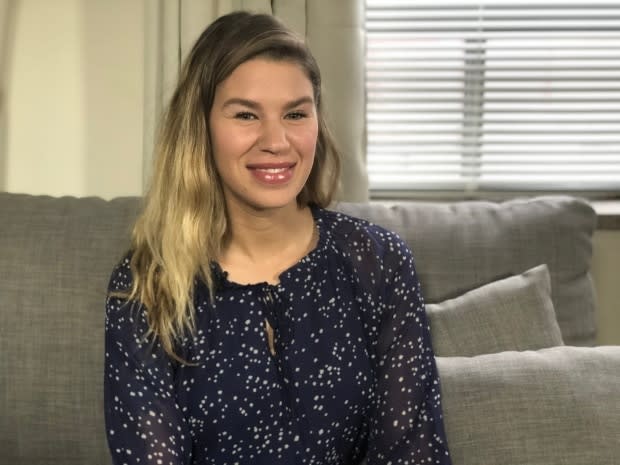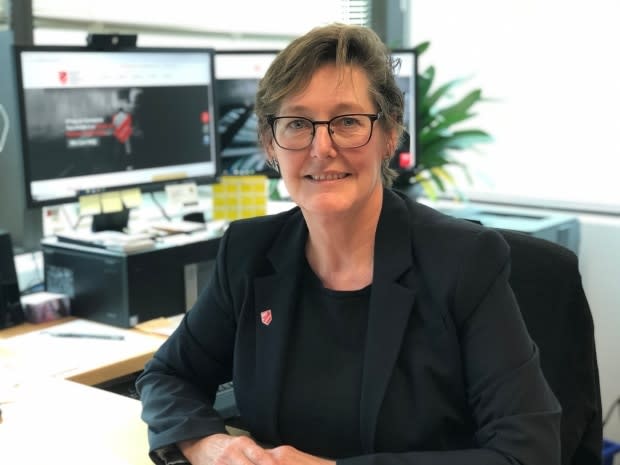Human trafficking hotline that started 6 months ago already has over 1,000 calls
Kaitlin Bick says when she was being sex trafficked in the GTA, she had no idea what was happening to her.
"I thought I had a crappy boyfriend," she said.
Young, vulnerable and without a support network, she was exploited for years. It only stopped when the car she and her two traffickers were in was pulled over in Marathon, Ont., more than 1,000 kilometres northwest of Toronto.
Bick, who was then 24 and had been in and out of the sex trade for almost a decade, says it's common for traffickers to move their victims along highways.
"It's just to not be detected," Bick said.
She says traffickers often move their victims hundreds of kilometres to steer clear of law enforcement.
"It's a circuit, and people are moving to get new business, to get more money, to not be detected by police."
Bick says at the time she and her traffickers were pulled over, they were arrested for drug possession. When the officer asked Bick what the men's names were, she said, "I told them the names they gave me, and those were the incorrect names."
Full of fear in that moment, her journey to recovery began.
Stories like this are not uncommon to Toronto police, or those operating The Canadian Centre to End Human Trafficking. It's the reason the centre launched a human trafficking hotline six months ago. To date, the hotline has had over 1,000 phone calls, emails and messages to its online forum.
Bick, now 31, leads a youth group in Toronto and works with people facing housing and addiction issues. She says she was happy to hear about the launch of the hotline.
"Because being a survivor of domestic sex trafficking, it's very lonely," she said.

"I didn't know what was happening to me, and when I figured it out, having someone to talk to about it and reaching out to a specialist is very unique."
Bick explains how common it is for traffickers to recruit young women.
"There are people waiting outside the bus stations, malls, movie theatres, high schools," she said.
Shelters and social assistance offices can also be places where traffickers target young and vulnerable people, Bick said.
"They'll ask, 'Are you lost? Do you need a bus ticket? You look like you need a friend.'"
Bick became emotional as she described how traffickers manipulate young women to recruit other young women.
"I think about all those young people that are recruiting other young people. It's survival," she said.
Many of the young people doing the recruiting have been trafficked themselves, said Bick.
'Necessary tool for the country'
Barbara Gosse is the CEO of the Canadian Centre to End Human Trafficking, which was established in 2016.
She says first and foremost, the hotline is an important tool to assist victims and survivors but is also equipped to support anyone who has a human trafficking tip, is requesting information or is a family member of someone who's been trafficked.
The hotline can help victims plan their escape by getting them in contact with women's shelters. It also refers callers to several agencies — including police — and keeps all information they receive confidential.
"So anyone at any time can call in anonymously," Gosse said.
"They can call for information; they can call to report a tip; they can call in if they're a victim or a survivor."
The hotline is available 24/7 and operates in over 200 languages. It accepts emails and tips to an online web forum in addition to phone calls.
"The human trafficking hotline is an absolutely necessary tool for the country," Gosse said.
The staff at the hotline have over 60 hours of victim-centred training. The centre is also using the hotline to collect data.

"We collect anonymous data. It does not collect any personal information from any of the callers, and we always ask for consent from the caller."
Gosse said the data helps the centre determine what types of human trafficking are happening and where. She says Ontario is the province with the highest number of calls, but it's occurring everywhere.
"The call volumes are showing that human trafficking is prevalent across the country in big cities but also smaller communities as well, and we know from talking to law enforcement and front-line workers that they are absolutely maxed out," she said.
Gosse said that it isn't just sexual exploitation; there are also significant cases of forced labour.
Partnership with Toronto police
Det. David Correa, with the Toronto police Human Trafficking Enforcement Team, says he recognizes victims of human trafficking may have had bad experiences with police and that it's important for his team to partner with other agencies.
"You think you can do everything by yourself. But when you're dealing with really vulnerable people, partnerships are crucial," he said. It was a "no-brainer" when Gosse approached Toronto police about working together on the hotline, he said.
Correa says there's a protocol in place to receive the hotline's referrals.
"The tips that are coming in out of the centre are very thorough, very well put together, very organized, which is something good for us," he said.
While there haven't been any arrests that have come directly from the hotline yet, the tips have helped the team to "expedite investigations," Correa says.

When Bick was being manipulated by her traffickers, she says she was afraid to contact police.
"For myself, my traffickers made it very clear that what I was doing was illegal and I would go to jail, so the police weren't really on my radar."
Bick says the topic is often taboo, and not many people even know it happens so close to home.
"If that was around when I was being trafficked, and all alone in my hotel room and I was able to hear about it or find out about it or have someone tell me, it would have made a difference."
The Canadian Centre to End Human Trafficking's hotline can be reached at 1-833-900-1010.


